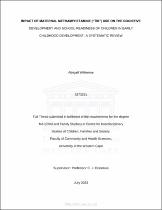Impact of maternal methamphetamine (“tik”) use on the cognitive development and school readiness of children in early childhood development: a systematic review
Abstract
Methamphetamine (MA) is one of the most used synthetic simulants globally and is reportedly the second most prevalent illicit drug. The abuse of methamphetamine among pregnant women is a growing problem worldwide. Exposure to this drug affects children's prenatal and postnatal development, which manifests in the growing child during early childhood development (ECD). Therefore, the current study examined the impact of maternal methamphetamine (‘tik’) use on children’s cognitive development and readiness for school. A systematic review study design was utilised in order to obtain the findings of the study. A systematic review is the reviewing of diverse and inter-related studies in order to provide an interpretive understanding of an issue and present a balanced and impartial summary. The present systematic review critically filtered and evaluated peer-reviewed, full-text studies in the English medium between the years 2010 to 2020 of available research relevant to this particular research question: “What is the impact of maternal methamphetamine use on the cognitive development and school readiness of children in early childhood development?”.

